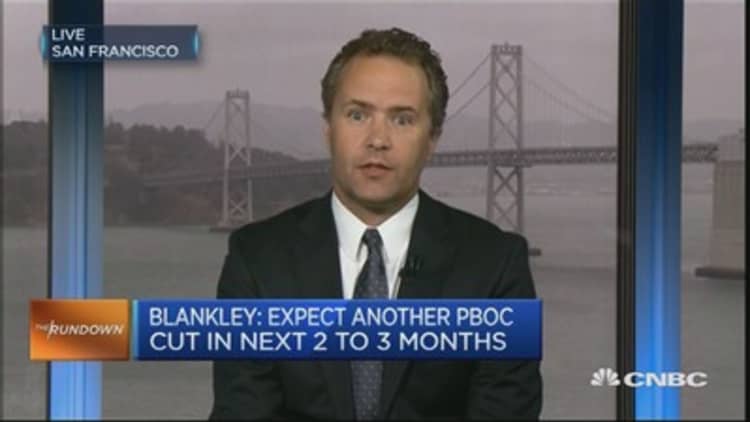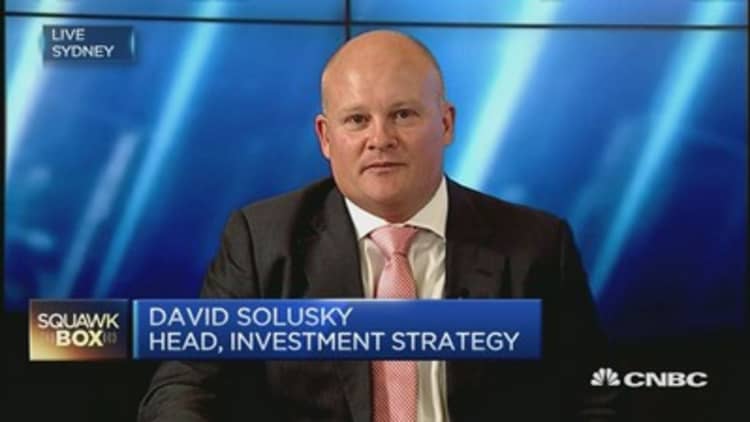Equity markets in China witnessed extreme volatility on Thursday amid signs that brokers in the country were clamping down on margin financing, while other bourses in the region traded mixed.
Overnight, U.S. stocks ended higher on positive economic data and optimism that a resolution was in sight for the Greece debt talks. The tech-heavy Nasdaq led gains with a 0.45 percent rise, while the Dow Jones Industrial Average and the S&P 500 closed up 0.36 and 0.21 percent, respectively.
Meanwhile, U.S. Treasury yields rose in tandem with their European peers as European Central Bank (ECB) President Mario Draghi said markets should get used to periods of higher volatility. That sent German Bund yields to their highest level since October.
Mainland markets volatile
China's Shanghai Composite index closed up 0.76 percent amid huge swings, as liquidity concerns over this week's new share offerings and news of restrictions on margin financing tempered risk sentiment. After getting off to a positive start, the Shanghai bourse fell as much as 262 points - more than 5 percent - in after-lunch trading before hurling itself back above the flatline in the last hour.
According to analysts, brokerage house Golden Sun Securities halted all margin financing on the start-up board Chinext, which comprises mainly of small-cap companies that are seeing high growth and high valuations. With much of China's rally being driven by liquidity, some analysts fear that this could bring the country's bull market to a standstill.
"This is a worrying development for the Chinese equity bulls as margin financing may be curtailed in a big way if other brokerages follow suit. The rollover effect could damage the upward momentum seen in bigger markets such as the CSI 300," wrote IG market strategist Bernard Aw in a note issued Thursday.
The CSI300 index of the largest listed companies in Shanghai and Shenzhen edged up 0.74 percent amid choppy trade, while the smaller Shenzhen Composite index trimmed losses to 0.58 percent.
Read MoreChinese property tycoon bets on 'uber for offices'
Meanwhile, Hong Kong's Hang Seng index shaved off 0.4 percent. Decliners included Alibaba Pictures which retreated 5.3 percent after announcing it will raise at least $1.6 billion from a share placement.
Outperforming the bourse, automaker BYD surged 8.8 percent in Hong Kong after resuming trading following the approval of an A-share private placement of 15 billion yuan. Shares of the Warren Buffett-backed automaker rose by the daily trading limit of 10 percent in Shenzhen.

ASX loses 1.4%
Australia's S&P ASX 200 index finished at its lowest level since January 27, chalking up a four-day losing streak, after soft economic data dampened trading sentiment. April retail sales came in flat from the month before, missing expectations for a 0.4 percent rise, while trade balance showed a wider-than-expected deficit of A$3.8 billion.
The resources sector suffered steep losses, with gold producer Newcrest Mining and energy play Oil Search closing down 3.3 and 2.3 percent, respectively. Among miners, Fortescue Metals was the biggest loser with a slump of 3.17 percent.
Retailers were also in focus following the dismal retail sales data; Harvey Norman was the sole bright spot in the sector, up 2.3 percent, while JB Hi-Fi and Myer lost 0.3 and 2.8 percent, respectively. Grocery supplier MetCash tumbled nearly 20 percent after saying it would scrap its dividend and take a $498 million impairment charge.
Shares of SEEK pared earlier gains to close down 0.3 percent following news that the jobs website will fork out $125 million to boost its majority stakes in Seek Asia and OCC Mundial.
Meanwhile, National Australia Bank is reportedly in exclusive talks with Japan's Nippon Life to sell the bank's life insurance division, according to the Australian Financial Review. Shares of the lender widened losses throughout the day to end down 2.06 percent.
Speaking to CNBC about whether the Australian market could see a rebound soon, David Solusky, head of investment strategy at UBS Wealth Management, said: "Banks have been sold fairly hard over the past week, alongside an iron ore rebound, [so] when we look at the very near term, we can see a bounce off those levels. But I think over the medium term, there are a lot of headwinds for the equity market to advance back to the level of 5,900."

Kospi gains 0.5%
South Korea's Kospi index recovered after three straight days of losses, largely with the help of a 5 percent jump in its top weighted stock Samsung Electronics.
U.S.-based hedge fund Elliott said Thursday it bought a 7.1 percent stake in Samsung C&T Corp and criticized the all-stock takeover offer from Cheil Industries -Samsung Group's de facto holding company- as unfair. Cheil Industries announced last week that the merger with affiliate Samsung C&T will take place by September.
As a result, shares of Cheil Industries and Samsung C&T bolstered 5 and 10.3 percent, respectively.
Also helping sentiment was revised gross domestic product (GDP) released before the market open, which showed the economy expanded at a quicker pace in the first quarter.
Asia's fourth-largest economy grew 2.5 percent from a year earlier, beating the central bank's forecast for a 2.4 percent rise. On a quarter-on-quarter basis, South Korea expanded by a seasonally adjusted 0.8 percent in January-March over the previous quarter.
Read MoreWhy Japanese stocks could keep crushing the S&P
Nikkei adds 0.1%
Japan's Nikkei 225 ended Thursday with marginal gains, thanks to some support from the dollar-yen which advanced a tad to trade at 124.35.
Index heavyweight Softbank is in focus after announcing a $1 billion investment in South Korea's e-commerce player Coupang late Wednesday. Shares of the mobile carrier erased morning gains to close down 1.2 percent.
Another underperformer was online retailer Rakuten, which plunged more than 6 percent, following news that it plans to issue new shares in order to raise about $1.5 billion.
Financials ranked high among the most actively-traded stocks; Sumitomo Mitsui Financial Group and Mitsubishi UFJ Financial Group rallied 1.1 percent each, while Mizuho Financial Group ended up 0.9 percent.

